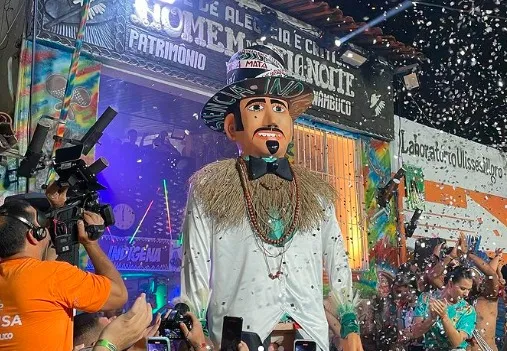On Saturday (10), the traditional Carnival block “The Midnight Man” (“O Homem da Meia-Noite”, in Portuguese) paid homage to Indigenous peoples in its 92nd parade in the city of Olinda, Pernambuco state. With the theme "Indigenous Land", the Xukuru do Ororubá people, from the town of Pesqueira, in the Agreste region of Pernambuco, Caboclinho Sete Flexas and singer Marron Brasileiro represented the tribute during the parade.
The huge doll, which refers to the Midnight Man, was dressed in costumes with messages about the struggle of Indigenous peoples in Brazil, such as land demarcation. Some of the phrases include "Demarcation now!", "Save the forest", "Democracy means demarcating [Indigenous] territories", "Diverse Indigenous peoples" and "Pernambuco, ancestral land".
Another important element in the construction of the theme was the phrase "Brazil, Indigenous land", printed on the doll's white coat. A necklace made of straw from the Sertão region, widely used in Indigenous handicrafts, also emphasized the region's richness.
The parade went through the streets of Olinda's Historic Site and, at the end, the doll handed over the keys to the city to the Cariri Olindense Carnival block, which opens Carnival Sunday.
The block was founded in 1931 and became a Living Heritage of Pernambuco in 2006. Its most striking feature is the fact that it is not just a doll, but a so-called calunga, the name of a sacred element of the Candomblés [an Afro-Brazilian religion] in Pernambuco.




